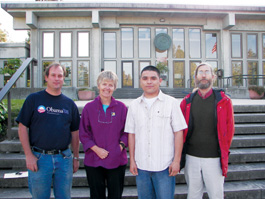home | metro santa cruz index | news | santa cruz | news article

Go for long: Extra help worker Daniel Torrez (third from left), surrounding by SEIU support staff, has been working for Santa Cruz County without benefits since 2002.
Equal Pay for Equal Work?
SEIU 521 rallies for reform of temporary worker system
By Steve Hahn
Temporary workers organized by the Service Employees International Union (SEIU) local 521 held a rally in front of the Santa Cruz County Government building April 18 to protest their lack of retirement, health, holiday and sick pay benefits. The rally was held in five other cities across California as well to coincide with a state legislation committee hearing on A.B. 1496, which would require a public legislative hearing outlining the specific duties and job end date of any temporary position in county governments before a worker could be hired to fill it.
The bill would prevent what SEIU members and bill sponsor Sandre Swanson see as corner-cutting by county officials across the state, who avoid paying benefits if they fill permanent positions with a rotating pool of temporary workers.
"If there's a vacancy in a regular budgeted position, in the past a series of temporary workers would be used to fill the position," says longtime SEIU member and county employee Jeffrey Smedberg. "We're challenging the county on some of those practices. If it's ongoing, year in and year out, it is a permanent job."
Santa Cruz County Public Information Officer Dinah Phillips says hiring people for longer than the 999 hours before they automatically qualify for retirement benefits, or renewing their job at the beginning of the new year after the hours are reset, goes against official county policy.
"I know that every position that gets filled has to have a document that gets filled out with it, and whenever it's extra help, they should have an end date," she says. "We have no intention of hiring these people and having them work on-and-on, it should be temporary, have an end-date and be in truth temporary. That is the county policy."
Yet SEIU member Daniel Torrez, who was recently promoted to a clerk position in the Health Services Agency, says he has worked on a temporary basis since 2002 without ever receiving any benefits or offers to be classed into a permanent position.
Torrez, who was studying at Cabrillo and UCSC at the same time he was working at the county, complains that the lack of sick or holiday pay has made money for books, tuition and basic necessities stretched incredibly thin. During holiday season it could get even worse, as he would be forced to take each holiday off without pay.
Still, Torrez claims to have seen much worse hardships imposed on temporary workers with larger families to support.
"A lot of the time they do the same jobs as regular employees but don't get compensated the same as regular employees," Torrez says. "If they're working paycheck to paycheck and have a holiday they have to take off, it's really hurting them more than other extra help employees."
It may initially seem odd that SEIU and, according to Phillips, official county policy both oppose rotating temporary workers through what would otherwise be classed as permanent positions.
But Smedberg perceives an economic disincentive behind this practice that may be working within the planning sphere of the government, even if, according to a study done by SEIU, one-third of county employees classified as temporary in California have been in their job for more than five years.
"One of the advantages you get from somebody being a regular worker is their experience; they've learned the job. With some new person, it takes them a while to get oriented," he says. "How much time and effort is spent training a whole series of new people over and over?"
There are other indications that the county may be working against its best interests with temporary worker practices. When Megan Arthur was hired during last year's election she was ecstatic to be offered an extended position past election time, but soon became frustrated that she would be forced to leave the office even when there was work to be done so she wouldn't overrun her hours.
"I knew they would keep me on for as much of the 999 hours as they could, because I did good work and they needed the work done. They wanted me there 9 to 5, Monday through Friday, and during election period from 6am to 1am," she says, noting she was forced to take a state job with the courts after maxing out her hours at the county job. "Now they're without me, and they had someone doing a chunk of work that they don't have anymore."
Send a letter to the editor about this story.
|
|
|
|
|
|